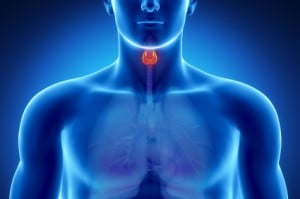The thyroid plays a big part in regulating a person’s metabolism and, in turn, the body’s growth and development. It is the largest organ in the endocrine system, a collection of glands that secrete hormones directly into the circulatory system. These hormones are carried to target organs to help modulate necessary body functions.
The thyroid produces 3 hormones:
Thyroxine (T4), Triiodothyronine (T3) and Calcitonin.
Roles of Thyroid Hormones in Metabolism
T4 and T3, also called metabolic hormones, play significant roles in energy regulation. Both are made in the thyroid gland using iodine, a trace mineral, and tyrosine, an amino acid. As their names suggest, T4 has 4 iodine molecules while T3 only has 3. These 2 hormones signal every cell in the body to increase cellular activity and metabolism. Too much or too little of T4 and T3 directly affects a person’s breathing, heart rate, nervous system, weight, temperature, energy use, and other necessary functions. The release of T4 and T3 is regulated by the pituitary gland’s thyroid-stimulating hormone (TSH). The release of TSH, on the other hand, is modulated
by a hormone produced by the hypothalamus.
The last of the 3 thyroid hormones, Calcitonin reduces calcium and phosphate in the blood. It promotes bone formation by instructing the body to absorb more calcium into the bone matrix.
Thyroid Diseases
Typical thyroid issues can be grouped into 3: hyperthyroidism or overactivity of the thyroid, hypothyroidism or underactivity, and growths that include cysts, nodules, and cancers.
Hyperthyroidism, or the increase of activity in the thyroid and overproduction of thyroid hormones, causes the body’s processes to speed up. People with this disease usually
experience the following symptoms: anxiety, excessive sweating, fatigue, hand tremors, heat intolerance, mood swings, muscle weakness, nervousness, palpitations, rapid heartbeat, sleep
problems, and weight loss.
Hypothyroidism, on the other hand, is when the thyroid does not produce enough thyroid hormones. The lack of T4 and T3 slows down the body’s processes. It is common for people with this disease to have poor appetite, hearing, and concentration, and to experience fatigue, shortness of breath, and weight gain.
A vast majority of thyroid growths or nodules do not cause signs or symptoms. However, some patients report pain that travels from ear to jaw. Should the thyroid grow too big, the patient might experience difficulty in swallowing, shortness of breath due to esophageal compression, or hoarseness from laryngeal compression.
The Next Step
Depending on the case, hyperthyroidism can be addressed with medicines, surgery, or radioactive iodine treatment. Anti-thyroid medication prevents the excessive production of T4 and T3. Patients typically take the medicine for 3 months to more than 1 year. Thyroidectomy, or the total removal of the thyroid gland, can also be carried out by an experienced surgeon.
While a safe and effective method, the surgery path includes a risk of damaging one’s vocal cords and parathyroid glands. Sometimes, the patient is also required to undergo thyroid hormone replacement therapy after the surgery. Last but not the least is orally taking radioactive iodine to gradually destroy the thyroid and effectively reduce the symptoms of hyperthyroidism.




